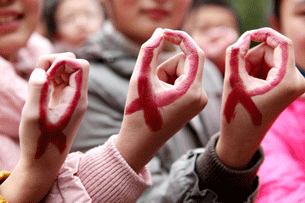China: AIDS orphans still not paid
| Publisher | Radio Free Asia |
| Publication Date | 3 January 2013 |
| Cite as | Radio Free Asia, China: AIDS orphans still not paid, 3 January 2013, available at: https://www.refworld.org/docid/50ed3412c.html [accessed 1 June 2023] |
| Disclaimer | This is not a UNHCR publication. UNHCR is not responsible for, nor does it necessarily endorse, its content. Any views expressed are solely those of the author or publisher and do not necessarily reflect those of UNHCR, the United Nations or its Member States. |
2013-01-03
Many local governments in China have failed to pay out subsidies to AIDS victims.
 Chinese students show their hands painted to look like red ribbons during a World AIDS Day event in Hanshan, central China's Anhui province, Nov. 30, 2012. AFP
Chinese students show their hands painted to look like red ribbons during a World AIDS Day event in Hanshan, central China's Anhui province, Nov. 30, 2012. AFP
AIDS orphans in Beijing, Shanghai, and worst-hit Henan province have still not been paid government subsidies promised to them back in 2009, a leading healthcare charity said in an annual report.
In its annual work report for 2012, Aizhixing said it had continued to monitor the performance of local governments in implementing prevention strategies and protecting patients' rights.
However, key non-government groups say many parts of China seemed barely aware of national-level AIDS policies.
"There are still a lot of local governments that haven't implemented directive No. 26 from 2009," said Henan-based AIDS activist Chang Kun.
"Guangxi has implemented it, and so has the government of Zaozhuang city in Shandong province," Chang said. "Xinjiang has implemented it."
But he added: "A number of governments including Beijing and Shanghai haven't implemented it."
An Aizhixing employee surnamed Yang said that under the 2009 measures, orphans whose parents had both died of AIDS should receive 600 yuan (U.S. $96) in subsidies every month, while single parent families with one parent lost to AIDS would get 200 yuan (U.S. $32) a month.
No subsidies
Many AIDS patients contacted by RFA for recent interviews said they were receiving subsidies of just 200 yuan per month, and some said they had received nothing at all.
Yang confirmed that many local governments had failed to pay out the subsidies, however, leaving such families in extreme hardship.
"We have applied for local governments to publish their figures on how many children have been affected by AIDS, and exactly how much they are paying them in subsidies," Yang said.
"We are also training people and telling them about the existence of this policy, because a lot of civil affairs departments and disease control and prevention centers won't take the initiative to tell the affected population about it."
Chang said many of those infected in Henan had had their subsidies boosted from just 20 yuan (U.S. $3) a month to 200 yuan a month, but that payouts still fell far short of those stipulated in Document No. 26.
"Of course, Henan has a comparatively large number of AIDS patients, and so the outside world pays close attention to them," he added.
Yang said the reasons for the failure to implement the policy were probably financial.
"Of course, this will have an impact on their budget, so we have launched a promotion campaign in a number of localities for Document No. 26, and this will continue [in 2013]," Yang added.
Payouts
Last month, dozens of AIDS patients from poverty-stricken rural areas of Henan converged on the Chinese capital to mark World AIDS Day, in a bid to win compensation and healthcare payouts.
Many were infected by tainted blood transfusions linked to blood-selling schemes, which a leading AIDS expert says are still common across rural China.
In August, hundreds of AIDS patients tore down the gates of the Henan provincial government buildings in a bid to get officials to take heed of their demands.
Some AIDS patients have tried unsuccessfully to sue the local authorities for failing to deliver promised treatment packages and adequate compensation after they were infected via tainted blood supplies in local hospitals and clinics.
Activists estimate that at least 100,000 people in Henan alone have been infected with HIV during the blood-selling schemes run by local governments, which bought blood donations from impoverished rural residents, but also took a cut of the proceeds.
Collectors paid villagers to give their blood, pooled it without testing for HIV or any other infections, extracted the valuable plasma and then re-injected the blood back into those who sold it. Around 40,000 of them have now died of AIDS, leaving around 60,000 still living with HIV.
Retired gynecologist and former medical professor Gao Yaojie, currently living in the United States, says the majority of new HIV infections come from a network of thousands of blood-selling and transfusion clinics which are still operating in poorer regions of the country.
According to UNAIDS, a concerted United Nations Programme on HIV/AIDS, by the end of 2011, 780,000 adults and children were estimated to be living with HIV in China, with 48,000 new infections in 2012.
In 2011, there were an estimated 28,000 deaths from AIDS-related causes.
Reported by Fang Yuan for RFA's Mandarin service. Translated and written in English by Luisetta Mudie.
Link to original story on RFA website
